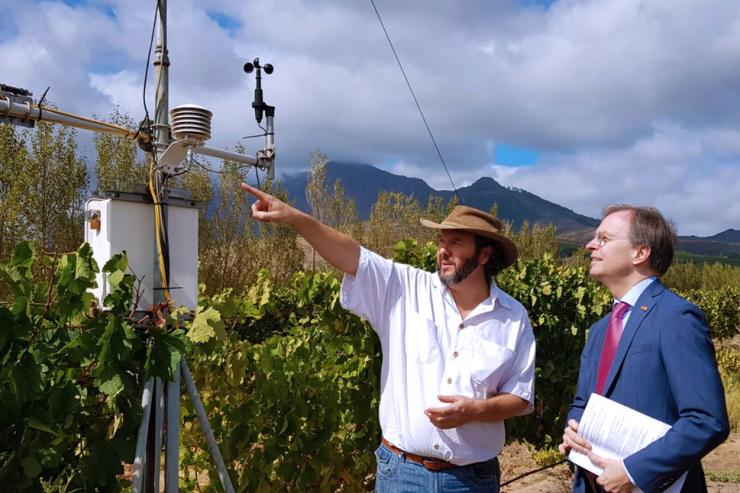

Saving Resources for the "Breadbasket" of South Africa
The Western Cape in South Africa is considered the bread basket of the country. It gets this name because the warm climate with its humid winters is ideal for wheat cultivation. The Cape is also known for its wines. The region is therefore crucial to the country's food security. But climate change is increasingly challenging farmers and winemakers: Experts expect that it will become hotter and drier in South Africa in the future. Lack of water could dry up the "bread basket", leading to the loss of biodiversity and damaging ecosystems. This is why the Federal Ministry of Research is supporting South Africa in the "FarmImpact" and "ASAP" joint research projects concerning the sustainable use of resources and the redesign of agriculture. Secretary of State Thomas Rachel inquired about the progress of the projects on a visit to the "Babylonstoren" vineyard, which participates in "FarmImpact". "We want to help South Africa find sustainable water and energy solutions for farms in the Cape. Our research funding should contribute to the implementation of the United Nations sustainability goals", said Rachel. One of them is ending hunger through better nutrition and sustainable agriculture. In order to implement this, South African scientists from Stellenbosch University, together with German partners, are researching so-called integrated measures in agriculture.
Water consumption can be controlled as needed
One important approach of the "FarmImpact" partners is, for example, using water in a way that saves resources. The winemakers use a local water reservoir to provide their vines with drip irrigation. This means that hoses meander through the fields and only release the required amount of water to the plants drop by drop. In addition, the researchers equipped the plants with sensors, whose measurement data can be read out online. This allows them to control water consumption as needed and increase resource efficiency. Remote sensing data also contributes to this. The technical solutions are combined with windbreak strips, in this case hedges, shrubs or rows of trees that slow down the wind before it hits the field. This also reduces the erosion of the nutrient-rich layers of the soil. This allows them to control water consumption as needed and increase resource efficiency in agriculture. The joint cultivation and use of trees and arable crops in so-called agroforestry systems represent a new perspective for sustainable agriculture in southern Africa and are also aimed at smallholder farms. A network of research institutions from southern Africa, of which Stellenbosch University is also a member, is working with German partners in the "ASAP" project to investigate the role of agroforestry systems as a method of adapting agriculture to regional climatic fluctuations.
Biodiversity is promoted and protected
Because one thing is clear: Trees reduce pollutants, thus protecting groundwater. In addition, they improve the climate in the fields and the fertility of the soil through evaporation. Another advantage: They help preserve biodiversity by providing habitat for birds, insects and field animals. And these in turn can loosen up the soil, thus making a contribution to sustainable agriculture. The researchers are also presenting their results in workshops so that farmers and winemakers throughout the country can benefit from them.
This article was published online on November 21, 2018.The text is published here courtesy of the Federal Ministry of Education and Research.
